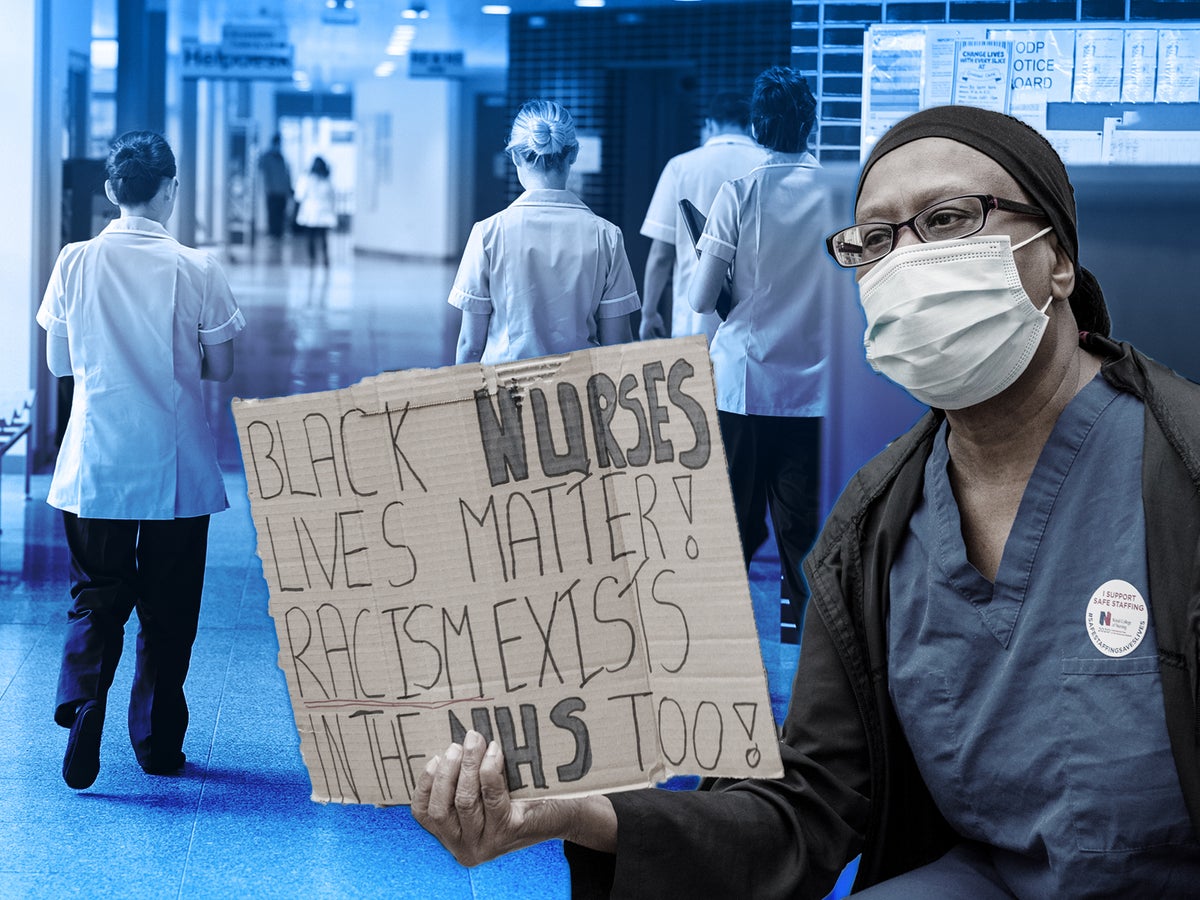
A third of Black and ethnic minority health staff have suffered racism or bullying as the NHS fails to address “systemic” levels of discrimination, The Independent can reveal.
Levels of bullying and harassment of minority workers have not improved in the past five years with almost 30 per cent saying they have been targeted in the past year, compared to 20 per cent of white staff.
Despite being one-quarter of the workforce, minority ethnic staff make up just 10 per cent of the most senior positions, the NHS’s flagship report is set to reveal.
One nurse told The Independent she was forced to leave her job following a campaign of bullying, while another, who has left for the private sector, said her mental health was hugely impacted by the discrimination she experienced.
Equality for Black Nurses, a membership organisation founded by Neomi Bennett in 2020, has launched 200 cases of alleged racism against a number of NHS trusts since it was set up.
“Racism is driving nurses out of the NHS,” Ms Bennett, told The Independent, warning that this issue had reached “pandemic levels”.
“I see day in and day out the effects of racial bullying and how this impacts nurses across the UK,” Ms Bennett continued. “The bullying of Black nurses has reached pandemic levels and goes unchallenged.
“However, there is a clear difference in experiences when comparing Black nurses’ difficulties to white nurses.”
She added that racism within the NHS was “systemic” and “deeply embedded” and said structures within the organisation allowed patterns of behaviour to be repeated.
Have you been impacted by this story? email rebecca.thomas@independent.co.uk and nadine.white@independent.co.uk.
As the NHS prepares to publish its annual Workforce Race Equality Standard (WRES) report, The Independent can reveal that the survey will show that the number of minority staff in the NHS has increased by 100,000 since 2018 – largely driven by increased international and overseas recruitment.
Despite this, it is struggling to make progress on equity with just two-fifths of staff reporting that their hospital provides equal opportunities and just 10 per cent of minority staff in top hospital roles.
Internal NHS survey figures show that race was the most commonly reported type of discrimination across all staff, with female workers of colour experiencing the highest level of discrimination in 2022. Other causes of discrimination, however, have reduced since 2016.
In that year, the NHS launched its first annual workforce race equality report, however, sources have said a survey last year showed little progress on key measures.
In April 2022, the government pledged to “close” the gap in pay in the NHS between different ethnic groups in a response to its commission on race and ethnic disparities.
But the latest data shows that white staff are still significantly more likely to be hired than their minority co-workers across more than two-thirds of NHS trusts.
Meanwhile, Black and ethnic minority staff are far more likely to enter a disciplinary process, with half of all trusts having unequal rates of referral by ethnicity.
The Independent has spoken to nurses across the country, represented by Equality for Black Nurses, who allege racism against their NHS employers and professional regulators.
One intensive care nurse said she was left broken after being suspended from work following a campaign of bullying.
Describing the management structure at her former employer as “exclusively white” she reported experiences of microaggressions and false accusations. She claims her appearance was made fun of and she faced barriers in workplace progression
After raising concerns about discrimination, she said she was bullied and claims other staff warned her to stop speaking out.
“I felt my whole world crashing down, like a big black hole that I just couldn’t get out of. As the trust targeted me, it seemed like I was drowning continuously. I couldn’t breathe and just wanted everything to end,” the nurse of 14 years, told The Independent.
Another nurse said she was left “traumatised” by bullying and harassment and she was “gaslighted” by her employer.
“This incident is going to affect me for the rest of my life … when I first joined [the NHS trust] I thought I was going to retire there but ... my career [has been cut] short and it’s not fair,” she said.
An NHS spokesperson said: “While our latest equality report shows that we have made progress in some areas of the NHS, it is completely unacceptable for anyone to experience racism, discrimination or prejudice at work and NHS organisations should strive to continually improve the experience of our diverse workforce – which, in turn, improves care for patients.
“The NHS is working closely with regulators including the General Medical Council to reduce disproportionate representation in referrals, and with Health Education England to focus on areas such as career progression and greater representation in senior roles as well as continuing to support local NHS areas to implement further improvement measures.”







